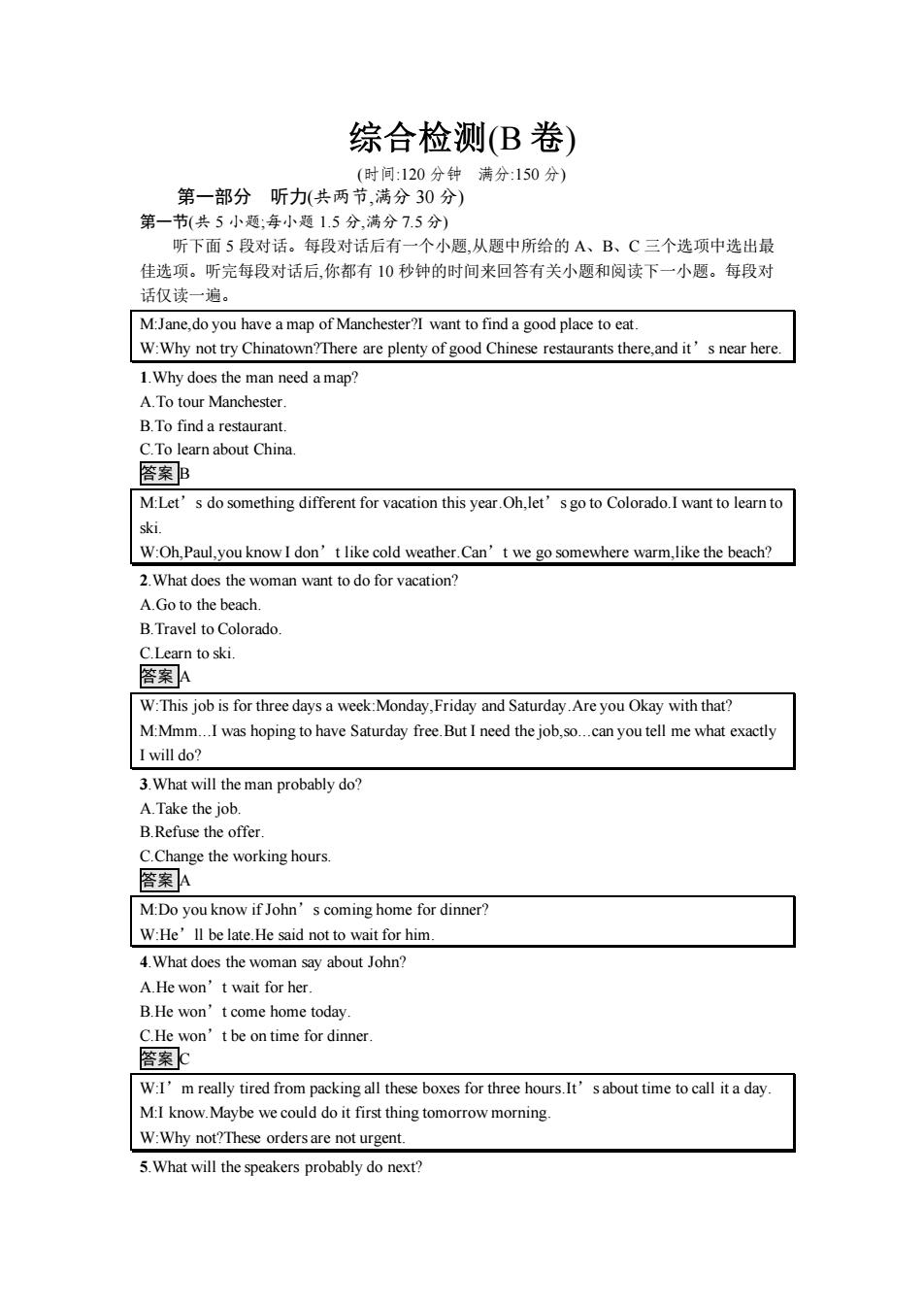
综合检测(B卷) (时间:120分钟满分:150分) 第一部分听力(共两节,满分30分) 第一节(共5小题;每小题1.5分,满分7.5分) 听下面5段对话。每段对话后有一个小题,从题中所给的A、B、C三个选项中选出最 佳选项。听完每段对话后,你都有10秒钟的时间来回答有关小题和阅读下一小题。每段对 话仅读一遍。 M:Jane,do you have a map of Manchester?I want to find a good place to eat. W:Why not try Chinatown?There are plenty of good Chinese restaurants there,and it's near here. 1.Why does the man need a map? A.To tour Manchester. B.To find a restaurant. C.To learn about China. 答案B M:Let's do something different for vacation this year.Oh,let's go to Colorado.I want to learn to ski. W:Oh,Paul,you know I don't like cold weather.Can't we go somewhere warm,like the beach? 2.What does the woman want to do for vacation? A.Go to the beach. B.Travel to Colorado. C.Learn to ski. 答案A W:This job is for three days a week:Monday,Friday and Saturday.Are you Okay with that? M:Mmm...I was hoping to have Saturday free.But I need the job,so...can you tell me what exactly I will do? 3.What will the man probably do? A.Take the job. B.Refuse the offer. C.Change the working hours. 答案A M:Do you know if John's coming home for dinner? W:He'll be late.He said not to wait for him. 4.What does the woman say about John? A.He won't wait for her. B.He won't come home today. C.He won't be on time for dinner. 答案c W:I'm really tired from packing all these boxes for three hours.It'sabout time to call it a day M:I know.Maybe we could do it first thing tomorrow morning W:Why not?These orders are not urgent. 5.What will the speakers probably do next?
综合检测(B 卷) (时间:120 分钟 满分:150 分) 第一部分 听力(共两节,满分 30 分) 第一节(共 5 小题;每小题 1.5 分,满分 7.5 分) 听下面 5 段对话。每段对话后有一个小题,从题中所给的 A、B、C 三个选项中选出最 佳选项。听完每段对话后,你都有 10 秒钟的时间来回答有关小题和阅读下一小题。每段对 话仅读一遍。 M:Jane,do you have a map of Manchester?I want to find a good place to eat. W:Why not try Chinatown?There are plenty of good Chinese restaurants there,and it’s near here. 1.Why does the man need a map? A.To tour Manchester. B.To find a restaurant. C.To learn about China. 答案 B M:Let’s do something different for vacation this year.Oh,let’s go to Colorado.I want to learn to ski. W:Oh,Paul,you know I don’t like cold weather.Can’t we go somewhere warm,like the beach? 2.What does the woman want to do for vacation? A.Go to the beach. B.Travel to Colorado. C.Learn to ski. 答案 A W:This job is for three days a week:Monday,Friday and Saturday.Are you Okay with that? M:Mmm...I was hoping to have Saturday free.But I need the job,so...can you tell me what exactly I will do? 3.What will the man probably do? A.Take the job. B.Refuse the offer. C.Change the working hours. 答案 A M:Do you know if John’s coming home for dinner? W:He’ll be late.He said not to wait for him. 4.What does the woman say about John? A.He won’t wait for her. B.He won’t come home today. C.He won’t be on time for dinner. 答案 C W:I’m really tired from packing all these boxes for three hours.It’s about time to call it a day. M:I know.Maybe we could do it first thing tomorrow morning. W:Why not?These orders are not urgent. 5.What will the speakers probably do next?
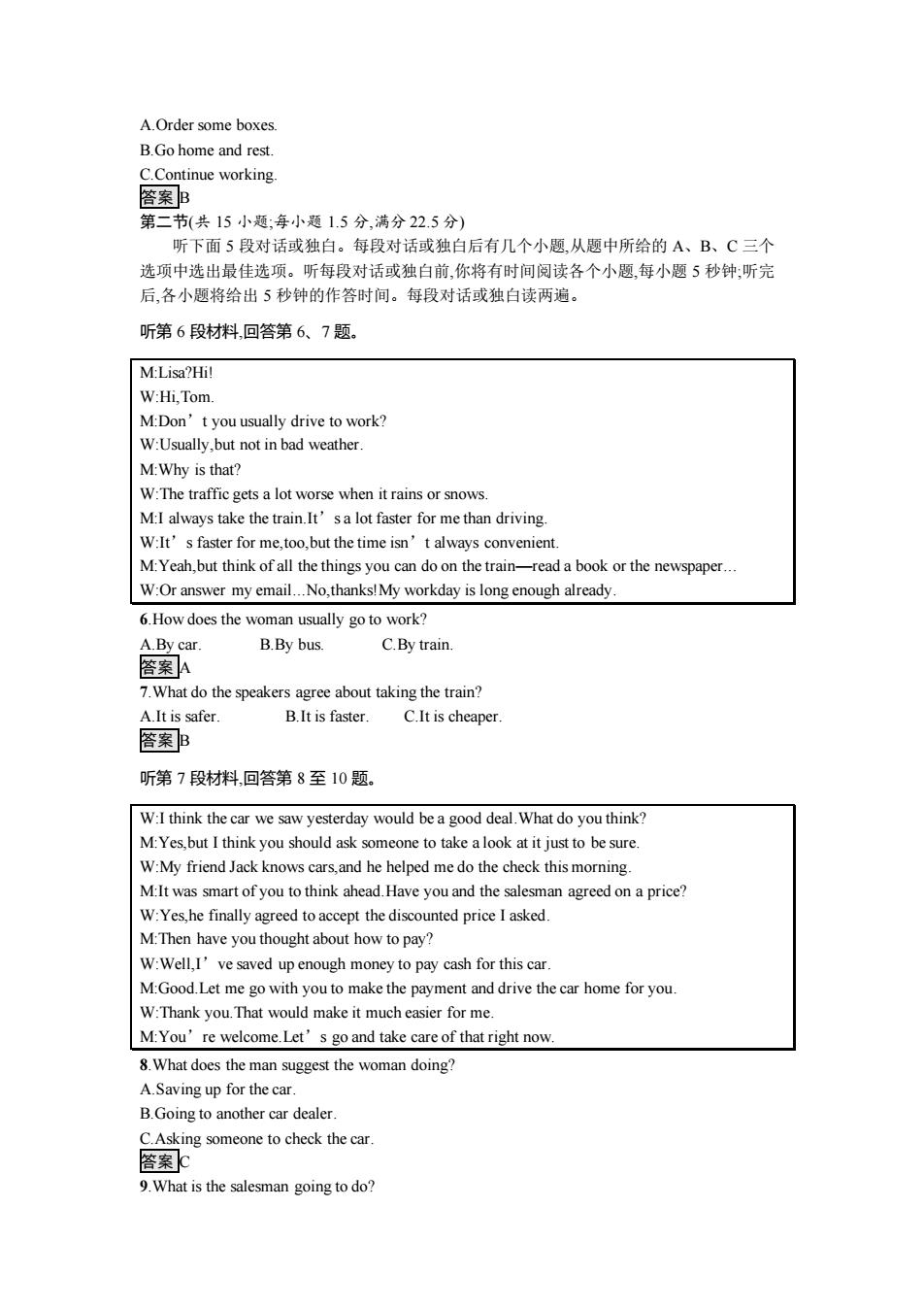
A.Order some boxes. B.Go home and rest. C.Continue working. 答案B 第二节(共15小题;每小题1.5分,满分22.5分) 听下面5段对话或独白。每段对话或独白后有几个小题,从题中所给的A、B、C三个 选项中选出最佳选项。听每段对话或独白前,你将有时间阅读各个小题,每小题5秒钟:听完 后,各小题将给出5秒钟的作答时间。每段对话或独白读两遍。 听第6段材料,回答第6、7题。 M:Lisa?Hi! W:Hi,Tom. M:Don't you usually drive to work? W:Usually,but not in bad weather. M:Why is that? W:The traffic gets a lot worse when it rains or snows. M:I always take the train.It's a lot faster for me than driving. W:It's faster for me,too,but the time isn't always convenient. M:Yeah,but think of all the things you can do on the train-read a book or the newspaper... W:Or answer my email...No,thanks!My workday is long enough already 6.How does the woman usually go to work? A.By car. B.By bus. C.By train. 答案A 7.What do the speakers agree about taking the train? A.It is safer B.It is faster.C.It is cheaper. 答案B 听第7段材料,回答第8至10题。 W:I think the car we saw yesterday would be a good deal.What do you think? M:Yes,but I think you should ask someone to take a look at it just to be sure. W:My friend Jack knows cars,and he helped me do the check this morning. M:It was smart of you to think ahead.Have you and the salesman agreed on a price? W:Yes,he finally agreed to accept the discounted price I asked. M:Then have you thought about how to pay? W:Well,I've saved up enough money to pay cash for this car. M:Good.Let me go with you to make the payment and drive the car home for you. W:Thank you.That would make it much easier for me. M:You're welcome.Let's go and take care of that right now. 8.What does the man suggest the woman doing? A.Saving up for the car. B.Going to another car dealer C.Asking someone to check the car. 客案 9.What is the salesman going to do?
A.Order some boxes. B.Go home and rest. C.Continue working. 答案 B 第二节(共 15 小题;每小题 1.5 分,满分 22.5 分) 听下面 5 段对话或独白。每段对话或独白后有几个小题,从题中所给的 A、B、C 三个 选项中选出最佳选项。听每段对话或独白前,你将有时间阅读各个小题,每小题 5 秒钟;听完 后,各小题将给出 5 秒钟的作答时间。每段对话或独白读两遍。 听第 6 段材料,回答第 6、7 题。 M:Lisa?Hi! W:Hi,Tom. M:Don’t you usually drive to work? W:Usually,but not in bad weather. M:Why is that? W:The traffic gets a lot worse when it rains or snows. M:I always take the train.It’s a lot faster for me than driving. W:It’s faster for me,too,but the time isn’t always convenient. M:Yeah,but think of all the things you can do on the train—read a book or the newspaper... W:Or answer my email...No,thanks!My workday is long enough already. 6.How does the woman usually go to work? A.By car. B.By bus. C.By train. 答案 A 7.What do the speakers agree about taking the train? A.It is safer. B.It is faster. C.It is cheaper. 答案 B 听第 7 段材料,回答第 8 至 10 题。 W:I think the car we saw yesterday would be a good deal.What do you think? M:Yes,but I think you should ask someone to take a look at it just to be sure. W:My friend Jack knows cars,and he helped me do the check this morning. M:It was smart of you to think ahead.Have you and the salesman agreed on a price? W:Yes,he finally agreed to accept the discounted price I asked. M:Then have you thought about how to pay? W:Well,I’ve saved up enough money to pay cash for this car. M:Good.Let me go with you to make the payment and drive the car home for you. W:Thank you.That would make it much easier for me. M:You’re welcome.Let’s go and take care of that right now. 8.What does the man suggest the woman doing? A.Saving up for the car. B.Going to another car dealer. C.Asking someone to check the car. 答案 C 9.What is the salesman going to do?
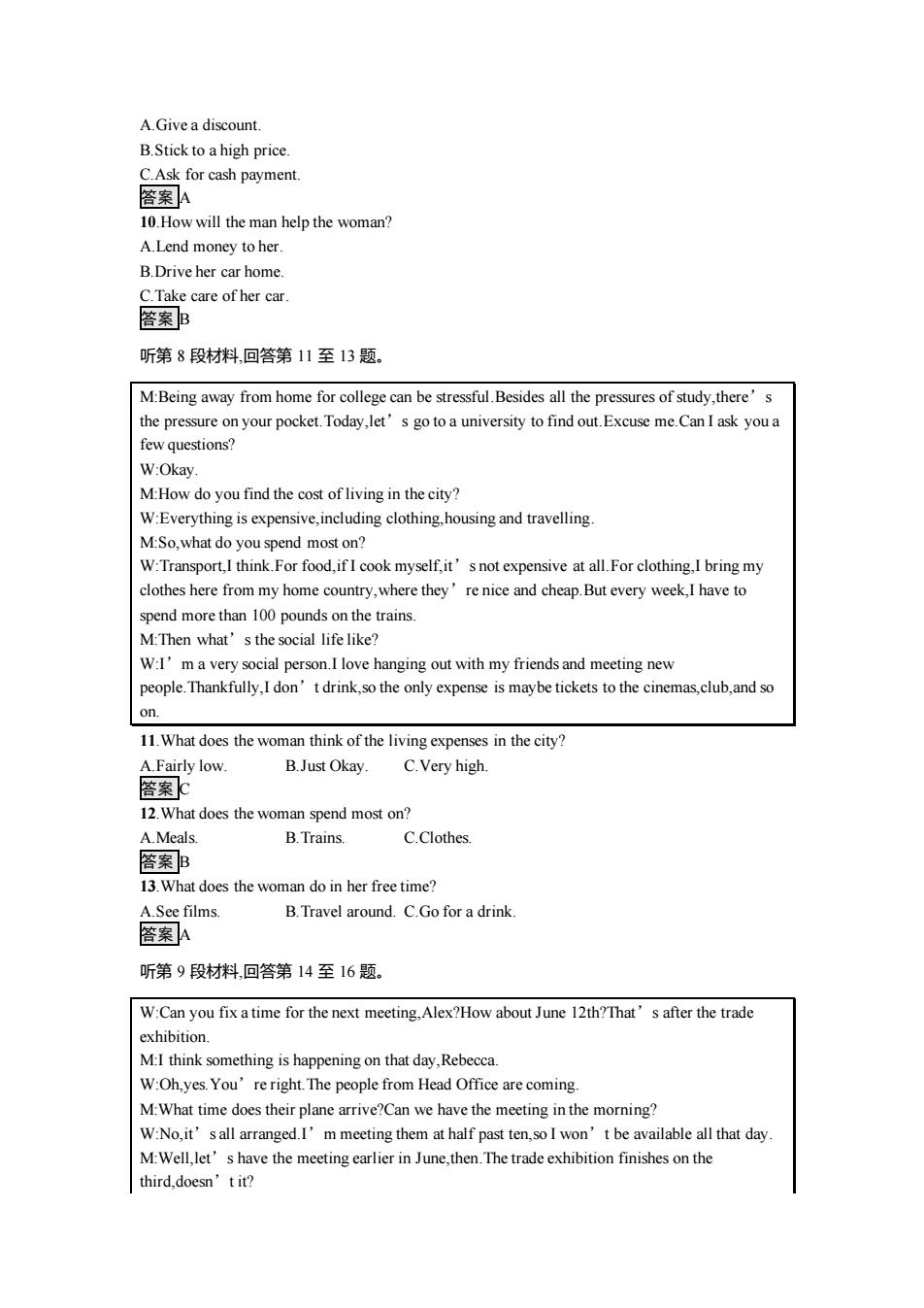
A.Give a discount. B.Stick to a high price. C.Ask for cash payment. 答案A 10.How will the man help the woman? A.Lend money to her B.Drive her car home. C.Take care of her car. 答案B 听第8段材料,回答第11至13题。 M:Being away from home for college can be stressful.Besides all the pressures of study,there's the pressure on your pocket.Today,let's go to a university to find out.Excuse me.Can I ask you a few questions? W:Okay. M:How do you find the cost of living in the city? W:Everything is expensive,including clothing,housing and travelling. M:So,what do you spend most on? W:Transport,I think.For food,if I cook myself,it's not expensive at all.For clothing,I bring my clothes here from my home country,where they're nice and cheap.But every week,I have to spend more than 100 pounds on the trains. M:Then what's the social life like? W:I'm a very social person.I love hanging out with my friends and meeting new people.Thankfully,I don't drink,so the only expense is maybe tickets to the cinemas,club,and so on. 11.What does the woman think of the living expenses in the city? A.Fairly low. B.Just Okay.C.Very high 答案 12.What does the woman spend most on? A.Meals. B.Trains. C.Clothes. 答案B 13.What does the woman do in her free time? A.See films. B.Travel around.C.Go for a drink. 答案A 听第9段材料,回答第14至16题。 W:Can you fix a time for the next meeting,Alex?How about June 12th?That's after the trade exhibition. M:I think something is happening on that day,Rebecca. W:Oh,yes.You're right.The people from Head Office are coming. M:What time does their plane arrive?Can we have the meeting in the morning? W:No,it's all arranged.I'm meeting them at half past ten,so I won't be available all that day. M:Well,let's have the meeting earlier in June,then.The trade exhibition finishes on the third,doesn'tit?
A.Give a discount. B.Stick to a high price. C.Ask for cash payment. 答案 A 10.How will the man help the woman? A.Lend money to her. B.Drive her car home. C.Take care of her car. 答案 B 听第 8 段材料,回答第 11 至 13 题。 M:Being away from home for college can be stressful.Besides all the pressures of study,there’s the pressure on your pocket.Today,let’s go to a university to find out.Excuse me.Can I ask you a few questions? W:Okay. M:How do you find the cost of living in the city? W:Everything is expensive,including clothing,housing and travelling. M:So,what do you spend most on? W:Transport,I think.For food,if I cook myself,it’s not expensive at all.For clothing,I bring my clothes here from my home country,where they’re nice and cheap.But every week,I have to spend more than 100 pounds on the trains. M:Then what’s the social life like? W:I’m a very social person.I love hanging out with my friends and meeting new people.Thankfully,I don’t drink,so the only expense is maybe tickets to the cinemas,club,and so on. 11.What does the woman think of the living expenses in the city? A.Fairly low. B.Just Okay. C.Very high. 答案 C 12.What does the woman spend most on? A.Meals. B.Trains. C.Clothes. 答案 B 13.What does the woman do in her free time? A.See films. B.Travel around. C.Go for a drink. 答案 A 听第 9 段材料,回答第 14 至 16 题。 W:Can you fix a time for the next meeting,Alex?How about June 12th?That’s after the trade exhibition. M:I think something is happening on that day,Rebecca. W:Oh,yes.You’re right.The people from Head Office are coming. M:What time does their plane arrive?Can we have the meeting in the morning? W:No,it’s all arranged.I’m meeting them at half past ten,so I won’t be available all that day. M:Well,let’s have the meeting earlier in June,then.The trade exhibition finishes on the third,doesn’t it?
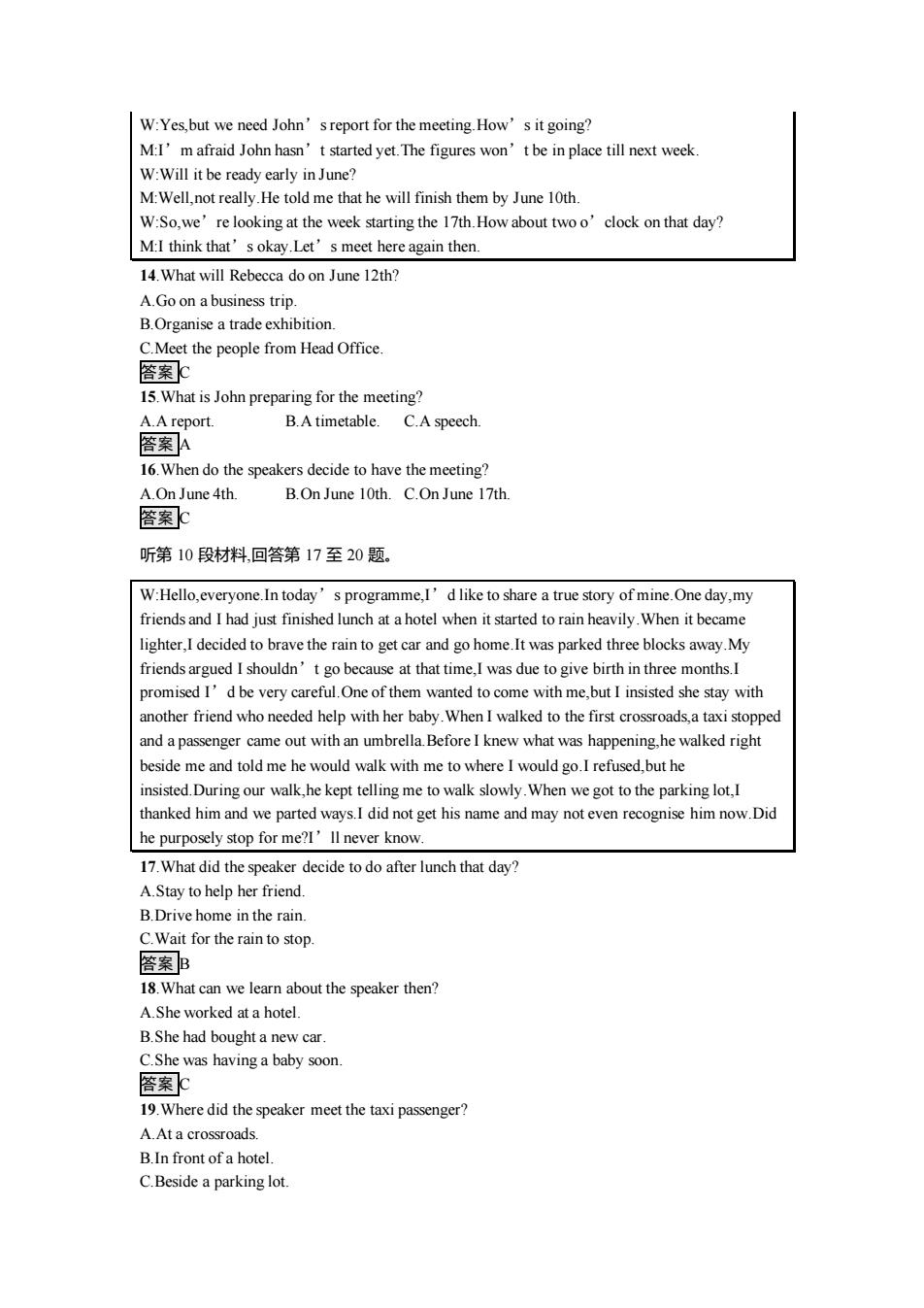
W:Yes,but we need John's report for the meeting.How's it going? M:I'm afraid John hasn't started yet.The figures won't be in place till next week W:Will it be ready early in June? M:Well,not really.He told me that he will finish them by June 10th. W:So,we're looking at the week starting the 17th.How about two o'clock on that day? M:I think that's okay.Let's meet here again then. 14.What will Rebecca do on June 12th? A.Go on a business trip. B.Organise a trade exhibition. C.Meet the people from Head Office. 答案C 15.What is John preparing for the meeting? A.A report. B.A timetable.C.A speech. 答案A 16.When do the speakers decide to have the meeting? A.On June 4th. B.On June 10th.C.On June 17th 窨案 听第10段材料,回答第17至20题。 W:Hello,everyone.In today's programme,I'd like to share a true story of mine.One day,my friends and I had just finished lunch at a hotel when it started to rain heavily.When it became lighter,I decided to brave the rain to get car and go home.It was parked three blocks away.My friends argued I shouldn't go because at that time,I was due to give birth in three months.I promised I'd be very careful.One of them wanted to come with me,but I insisted she stay with another friend who needed help with her baby.When I walked to the first crossroads,a taxi stopped and a passenger came out with an umbrella.Before I knew what was happening,he walked right beside me and told me he would walk with me to where I would go.I refused,but he insisted.During our walk,he kept telling me to walk slowly.When we got to the parking lot,I thanked him and we parted ways.I did not get his name and may not even recognise him now.Did he purposely stop for me?I'll never know. 17.What did the speaker decide to do after lunch that day? A.Stay to help her friend. B.Drive home in the rain. C.Wait for the rain to stop. 答案B 18.What can we learn about the speaker then? A.She worked at a hotel. B.She had bought a new car. C.She was having a baby soon. 客案 19.Where did the speaker meet the taxi passenger? A.At a crossroads. B.In front of a hotel. C.Beside a parking lot
W:Yes,but we need John’s report for the meeting.How’s it going? M:I’m afraid John hasn’t started yet.The figures won’t be in place till next week. W:Will it be ready early in June? M:Well,not really.He told me that he will finish them by June 10th. W:So,we’re looking at the week starting the 17th.How about two o’clock on that day? M:I think that’s okay.Let’s meet here again then. 14.What will Rebecca do on June 12th? A.Go on a business trip. B.Organise a trade exhibition. C.Meet the people from Head Office. 答案 C 15.What is John preparing for the meeting? A.A report. B.A timetable. C.A speech. 答案 A 16.When do the speakers decide to have the meeting? A.On June 4th. B.On June 10th. C.On June 17th. 答案 C 听第 10 段材料,回答第 17 至 20 题。 W:Hello,everyone.In today’s programme,I’d like to share a true story of mine.One day,my friends and I had just finished lunch at a hotel when it started to rain heavily.When it became lighter,I decided to brave the rain to get car and go home.It was parked three blocks away.My friends argued I shouldn’t go because at that time,I was due to give birth in three months.I promised I’d be very careful.One of them wanted to come with me,but I insisted she stay with another friend who needed help with her baby.When I walked to the first crossroads,a taxi stopped and a passenger came out with an umbrella.Before I knew what was happening,he walked right beside me and told me he would walk with me to where I would go.I refused,but he insisted.During our walk,he kept telling me to walk slowly.When we got to the parking lot,I thanked him and we parted ways.I did not get his name and may not even recognise him now.Did he purposely stop for me?I’ll never know. 17.What did the speaker decide to do after lunch that day? A.Stay to help her friend. B.Drive home in the rain. C.Wait for the rain to stop. 答案 B 18.What can we learn about the speaker then? A.She worked at a hotel. B.She had bought a new car. C.She was having a baby soon. 答案 C 19.Where did the speaker meet the taxi passenger? A.At a crossroads. B.In front of a hotel. C.Beside a parking lot
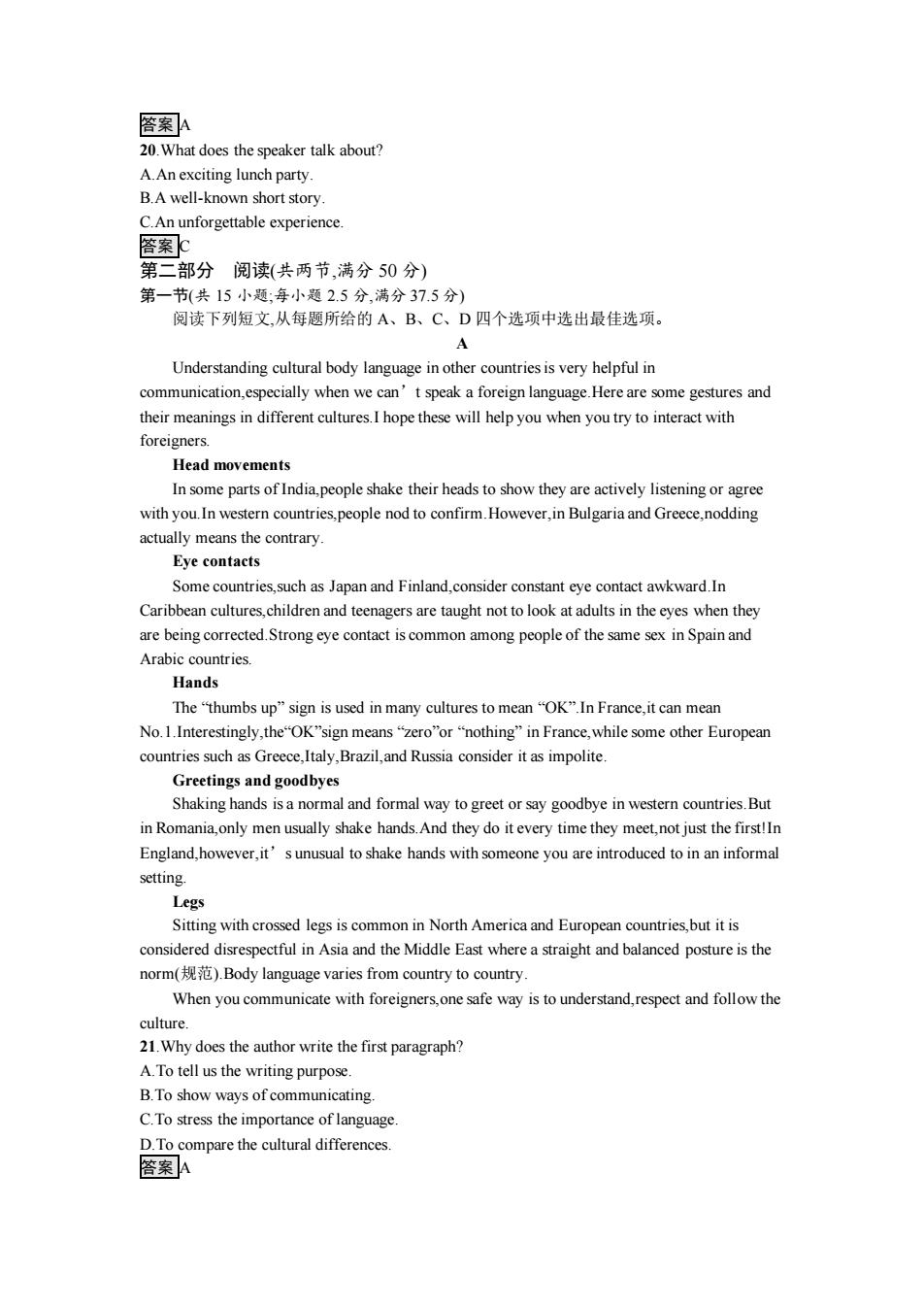
答案A 20.What does the speaker talk about? A.An exciting lunch party B.A well-known short story C.An unforgettable experience. 答案 第二部分阅读(共两节,满分50分) 第一节(共15小题;每小题2.5分,满分37.5分) 阅读下列短文,从每题所给的A、B、C、D四个选项中选出最佳选项。 A Understanding cultural body language in other countries is very helpful in communication,especially when we can't speak a foreign language.Here are some gestures and their meanings in different cultures.I hope these will help you when you try to interact with foreigners. Head movements In some parts of India,people shake their heads to show they are actively listening or agree with you.In western countries,people nod to confirm.However,in Bulgaria and Greece,nodding actually means the contrary. Eye contacts Some countries,such as Japan and Finland,consider constant eye contact awkward.In Caribbean cultures,children and teenagers are taught not to look at adults in the eyes when they are being corrected.Strong eye contact is common among people of the same sex in Spain and Arabic countries Hands The "thumbs up"sign is used in many cultures to mean "OK".In France,it can mean No.1.Interestingly,the"OK"sign means"zero"or"nothing"in France,while some other European countries such as Greece,Italy,Brazil,and Russia consider it as impolite Greetings and goodbyes Shaking hands is a normal and formal way to greet or say goodbye in western countries.But in Romania,only men usually shake hands.And they do it every time they meet,not just the first!In England,however,it's unusual to shake hands with someone you are introduced to in an informal setting. Legs Sitting with crossed legs is common in North America and European countries,but it is considered disrespectful in Asia and the Middle East where a straight and balanced posture is the norm().Body language varies from country to country. When you communicate with foreigners,one safe way is to understand,respect and follow the culture. 21.Why does the author write the first paragraph? A.To tell us the writing purpose. B.To show ways of communicating C.To stress the importance of language D.To compare the cultural differences. 答案A
答案 A 20.What does the speaker talk about? A.An exciting lunch party. B.A well-known short story. C.An unforgettable experience. 答案 C 第二部分 阅读(共两节,满分 50 分) 第一节(共 15 小题;每小题 2.5 分,满分 37.5 分) 阅读下列短文,从每题所给的 A、B、C、D 四个选项中选出最佳选项。 A Understanding cultural body language in other countries is very helpful in communication,especially when we can’t speak a foreign language.Here are some gestures and their meanings in different cultures.I hope these will help you when you try to interact with foreigners. Head movements In some parts of India,people shake their heads to show they are actively listening or agree with you.In western countries,people nod to confirm.However,in Bulgaria and Greece,nodding actually means the contrary. Eye contacts Some countries,such as Japan and Finland,consider constant eye contact awkward.In Caribbean cultures,children and teenagers are taught not to look at adults in the eyes when they are being corrected.Strong eye contact is common among people of the same sex in Spain and Arabic countries. Hands The “thumbs up” sign is used in many cultures to mean “OK”.In France,it can mean No.1.Interestingly,the“OK”sign means “zero”or “nothing” in France,while some other European countries such as Greece,Italy,Brazil,and Russia consider it as impolite. Greetings and goodbyes Shaking hands is a normal and formal way to greet or say goodbye in western countries.But in Romania,only men usually shake hands.And they do it every time they meet,not just the first!In England,however,it’s unusual to shake hands with someone you are introduced to in an informal setting. Legs Sitting with crossed legs is common in North America and European countries,but it is considered disrespectful in Asia and the Middle East where a straight and balanced posture is the norm(规范).Body language varies from country to country. When you communicate with foreigners,one safe way is to understand,respect and follow the culture. 21.Why does the author write the first paragraph? A.To tell us the writing purpose. B.To show ways of communicating. C.To stress the importance of language. D.To compare the cultural differences. 答案 A